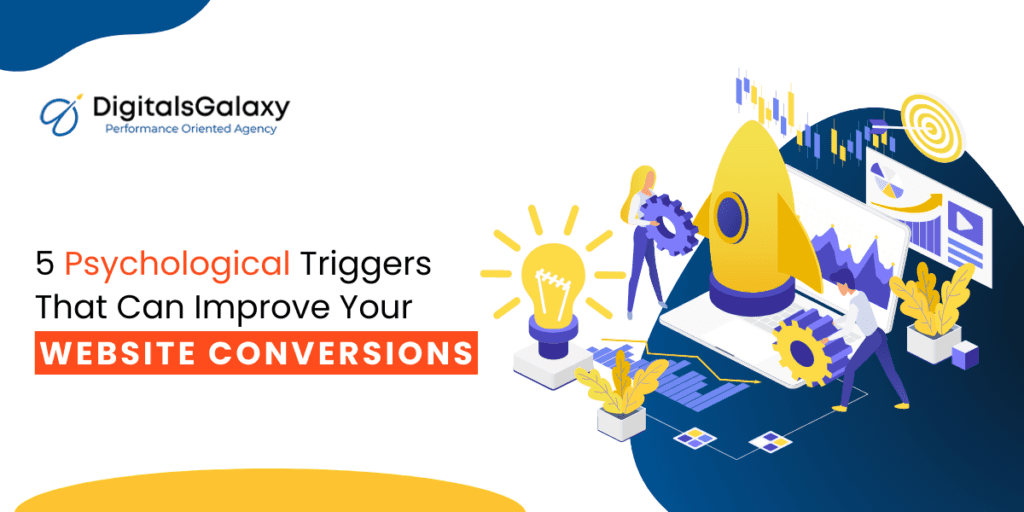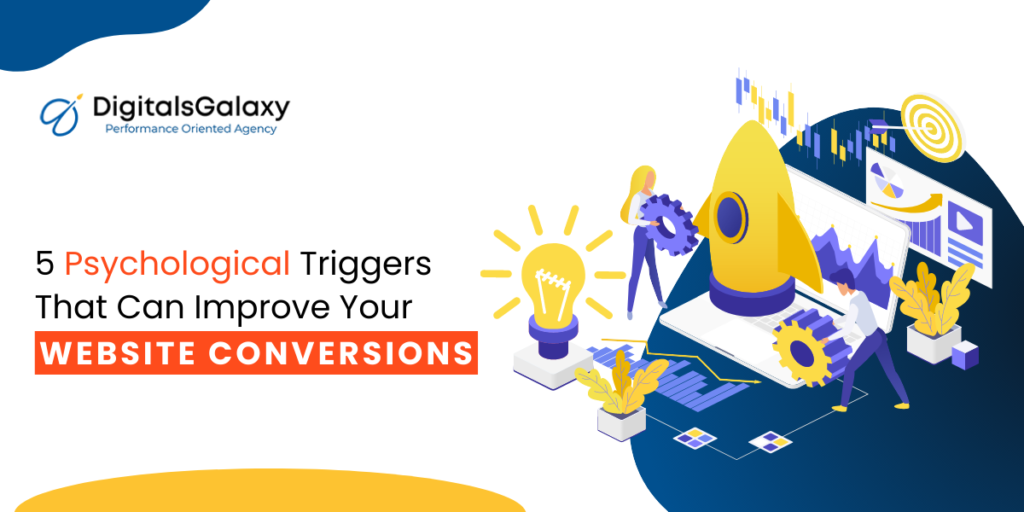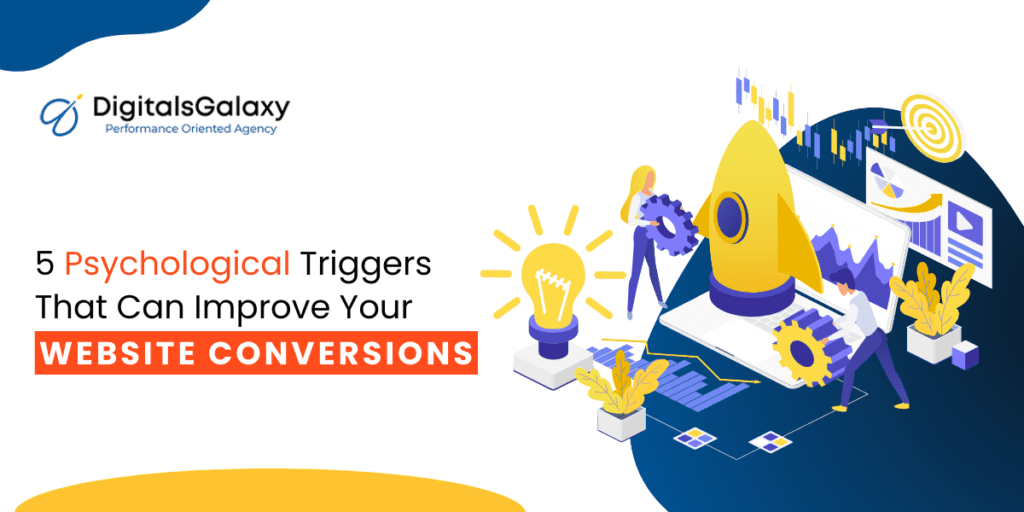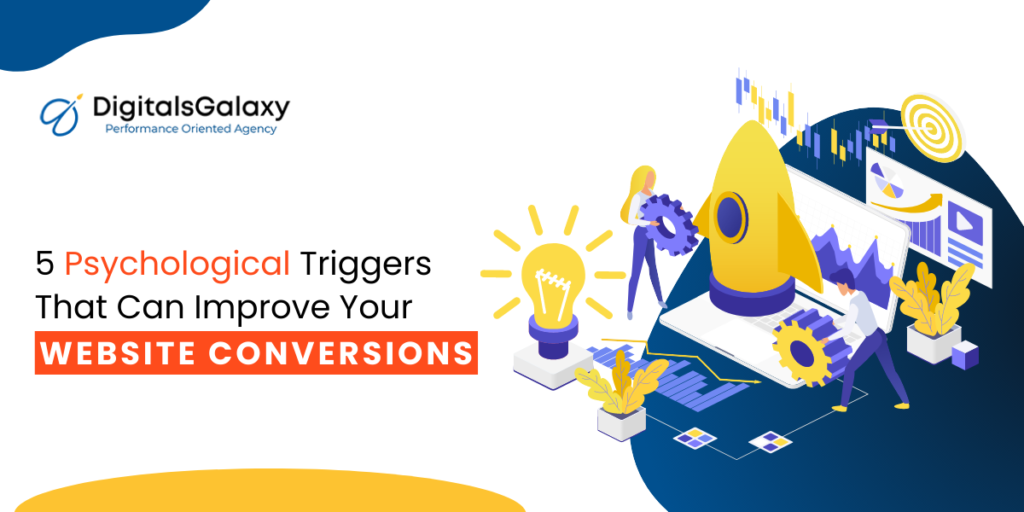Psychological triggers (or cognitive biases) are mental habits that explain why we tend to think in a certain manner. These habits (or “heuristics”) are not irrational; rather, they assist us in making quick decisions without much thinking. Human beings are emotional creatures. We make purchases based on how we feel, so we focus a lot on how marketing may appeal to our emotions rather than our reasoning abilities. The first thing a visitor sees when they land on a landing page has a huge effect on how often they buy from us. If we manage to trigger specific emotions in our customers before the purchase, we can increase revenues.
As a website owner, your main goal is to get people to visit your site and turn them into customers. But this isn’t always easy to do, especially if you don’t know much about the psychology behind website conversions. Psychology plays a crucial role in web design and marketing, and understanding how it works can help you improve your website conversions. In this blog post, we will explore five psychological triggers that can improve your website conversions.
Social Proof
Social proof is a powerful psychological trigger that can improve your website’s conversions. It refers to the tendency of people to follow the actions of others when they are unsure about what to do. Even though society sometimes values individuality, people are social creatures who like to think as a group. We seek out the approval of others and tend to stick with the crowd whenever possible.
One way to implement the idea of social proof into your business is to incorporate a lot of third-party proof into your website. You can take advantage of this by using user-generated content (UGC) on your landing pages. This includes feedback from customers, testimonials, and social media posts. When potential customers visit your website, they’ll see that other people are satisfied with your business, and they’ll be interested in the benefits that you can offer them. This will establish a sense of trust and credibility, which will inspire site visitors to make a purchase.
Scarcity
In academic terms, scarcity is “the fundamental economic issue associated with what seems to be unlimited human wants in a world with limited resources.” It says that society doesn’t have enough productive resources to meet all of the people’s needs and wants. It refers to the idea that people are more likely to act when they think something is in short supply.
Fear is what makes things scarce. As humans, we’re far more motivated by the fear of losing than we are by the desire of gaining. At least 56% of us have active FOMO, which drives consumer behavior and may even be the reason we love social media almost too much.
You can use scarcity by making people feel like they need to act quickly or that there aren’t many options. For example, you can use phrases like “limited-time offer” or “only 10 left in stock” to encourage people to take action. This can generate a fear of missing out, which can motivate site visitors to make a purchase.
The infomercial giants QVC, hotel and flight sites like Expedia, and even Amazon all use scarcity in the same way by showing countdowns of the number of items left (like “Only 9 left in stock”) and time limits (like “Want it tomorrow, Sept. 24? Choose one-day shipping at checkout if you place your order within 2 hours and 50 minutes.”
Authority
Authority is also a psychological trigger that can make people more likely to buy something from your website. It means that people are more likely to trust and adhere to the recommendations of people considered to be experts or authority figures in their field. You can establish credibility by displaying endorsements or certifications from leading institutions, industry experts, or influential individuals.
Celebrities are also used for the same reason. In Turkey, Trendyol is a fast-growing e-commerce company that “started launching campaigns with celebrity endorsements and saw a 30% increase in traffic and sales.” In Turkey, Trendyol is a fast-growing e-commerce company that “started launching campaigns with celebrity endorsements and saw a 30% increase in traffic and sales.” Logos are short forms of endorsements that demonstrate authority right away.
In other words, people don’t just pay attention to real authority, but also to how it looks. Businesses in the health, supplement, and weight loss industries often use recommendations from doctors and other medical experts.
Reciprocity
Reciprocity is a strong and deeply rooted psychological trigger that can increase the number of people who buy from your website. It refers to the tendency of people to feel obliged to return a favor or act of kindness. The most obvious way is through what is often called “lead magnets” or “carrot content offers.” By offering your audience a free but genuinely valuable email series, e-book, guide, consultation, online course, webinar, whitepaper, checklist, or special report, they are far more likely to take the next step in the sales process when it is presented.
When someone does something nice for you, even if it’s something small, you probably feel like you owe them something in return. That’s the idea behind reciprocity. Give small incentives to your visitors to get them to do business with you. This will make people feel good, which can make them more likely to make a purchase or do something else you want them to do.
Email marketing
Email marketing can be a powerful psychological trigger to improve website conversions. Email marketers can drive more traffic to their websites, get people to spend more time on their sites, and make more sales by sending targeted and personalized emails to their subscribers. Email marketing lets businesses send personalized messages based on customer data such as past purchases, browsing history, and preferences. By sending personalized emails, they can create a stronger emotional connection with customers, making them more likely to visit their websites and take action.
Email marketing can create a sense of urgency by using scarcity tactics such as limited-time offers, countdown timers, or stock availability. By highlighting the urgency of an offer, businesses can motivate customers to visit their website and make a purchase before it’s too late.





